Android has become the de-facto operating system for smartphones, IoT devices, cars, TVs, and other electronic devices. The open-source project is being deployed almost everywhere because of the vast app support, lightweight profile, compatibility with a variety of hardware, huge developer support, etc. Apple’s iOS is putting up a good fight, but it’s nowhere close to Android’s dominance. In such a scenario, there is almost no competition and we are on the verge of an Android monopoly in the market. Such a situation is not good for innovation and competition. So to find out potential alternatives to Android, we have compiled this article with the best Android alternative. We have compared privacy, security, features set, and a lot more in this article. On that note, let’s go ahead and find out the top 12 Android alternatives.
Why We Need Alternative to Android?
With around 72% market share, Android has become a monopoly in the mobile operating system market. There is not much choice for consumers, except to choose an Android device or go for the pricier iPhone. In such a scenario, we need more alternatives to accelerate innovation, bring more choices to consumers, add better privacy standards, and more. For the past many years, Android’s security has been lackluster. After Android 8, Google got serious about hardening the security of Android and closing the loopholes. In fact, in earlier Android days, there was no concept of runtime permission.
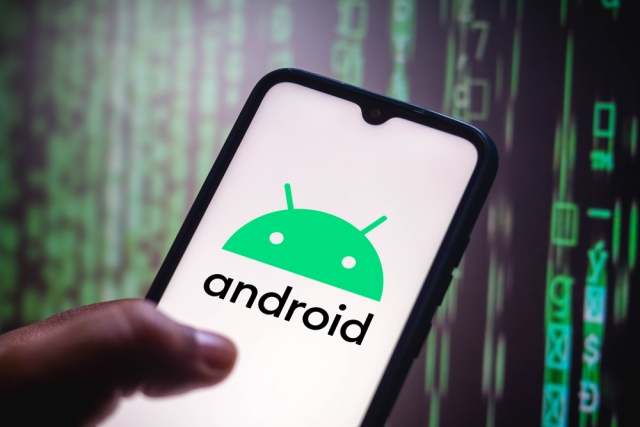
Currently, Android is on a course-correction phase where it’s bringing much-needed security features and privacy controls. Apple is forcing Google to bring privacy insights of apps, restricting apps from accessing clipboards, permission reminders, and so on. These are essential privacy features that are available on other mobile platforms for many years. Even today, we don’t have a user-facing network permission toggle on Android. Third-party apps can regularly scan all your installed apps, access your clipboard, and so on.
While Android is fixing some of these issues, most users are not getting the updates due to fragmentation. Google tried to resolve the fragmentation problem with Project Treble, but the truth is that, except for some manufacturers, not many are offering longer security and feature updates. To combat this situation and to put consumers on the safer side, we need an Android alternative that respects your privacy, does not trade user data for cheaper hardware, and comes with stronger security.
Best Android Alternative Mobile Operating Systems
1. iOS
With a 27.5% market share, iOS is slowly becoming the mainstream alternative to Android. Gone are the days when Android was feature-packed and iOS was for average users. iOS now comes with advanced features such as Shortcuts for automation, SharePlay to co-watch movies and shows with your friends and family, live text translation, and more. Siri is also getting quite better and the ecosystem support from various Apple devices is unparalleled in the Android world.
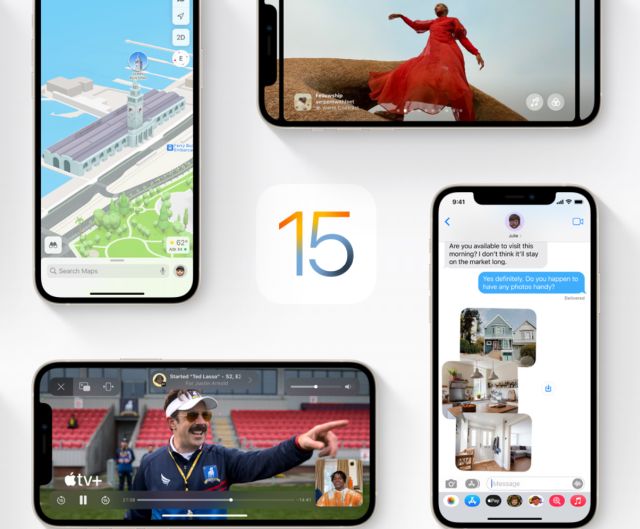
Not to mention, iOS is much more respectful of your privacy in comparison to Android. Recently, Apple added privacy report to the App Store where it displays all the user data the app is trying to collect. It also lets you request apps to disable tracking which is a great privacy feature to have. iOS is also simpler to use, although Google is working on Android to make it more accessible to a varied group of users. To sum up, if you want peace of mind with top-notch privacy and security, along with a legion of handy iOS features, Apple’s iOS positions itself as a suitable alternative to Android.
Pros Cons Beautiful UI, Smooth operation, easier to use Not open-source Much longer updates Devices are costly Great quality of apps Limited customization
2. GrapheneOS
If security and privacy are your main reasons behind your search for an Android alternative, GrapheneOS fits the bill perfectly. It’s a security-hardened operating system, built with top-notch privacy protection in mind. GrapheneOS, earlier known as CopperheadOS, is also developed on Android, but the main developer, Daniel Micay has worked extensively to make GrapheneOS a completely secure mobile operating system. Even Edward Snowden endorsed GrapheneOS and said that “If I were configuring a smartphone today, I’d use Daniel Micay’s GrapheneOS as the base operating system“.

Currently, it only supports Pixel devices including the latest Pixel 6 series. GrapheneOS has deployed major technologies to restrict a number of vulnerabilities and exploits. The app sandbox feature makes it harder for malware to attack your smartphone. There are additional permissions as well including network permission, sensors permission, USB access, camera access, and more.
Other than that, GrapheneOS ships with a hardened variant of Chromium called Vanadium for browsing the web, there is a security-focused PDF viewer, a secure camera app, Seedvault for encrypted backup, and a lot more. Not to mention, it does not ship with Google Play Services or microG, making it a completely deGoogled Android fork. All in all, if you are looking for a secure alternative to Android, GrapheneOS would be my top recommendation.
| Pros | Cons |
| Top-notch security and privacy protection | Limited device support |
| Based on Android | |
| First-party apps available |
3. KaiOS
For feature phones, KaiOS is a great alternative to Android. We know that Android has become quite heavy at this point. So to bring a lightweight mobile operating system to the masses, KaiOS serves the purpose really well without missing out on major features. It’s a Linux-based OS, forked from the discontinued Firefox OS, and can run on devices with just 256MB of RAM.

KaiOS packs its own KaiStore where you can find over 500 apps which include WhatsApp, YouTube, Facebook, Google Assistant, Google Maps, Google app, UC Browser, lightweight games, and more. There are hundreds of models available around the globe and the starting price of these phones is just $10 which is amazing. In India, JioPhone is quite popular which costs around $20-25 and runs KaiOS. To sum up, KaiOS is a perfect alternative to Android in regions where affordability is preferred over a long list of features.
Pros Cons Lightweight OS, a forked version of Firefox OS Not for the main Android smartphone market Supports Web-based apps Continually updated
4. Sailfish OS
Sailfish OS has been one of the oldest alternatives to Android, competing and developing a mobile operating system since 2013. It is currently in its 4th generation and is being actively developed by a Finnish company Jolla Ltd. Sailfish OS has been built on top of Linux along with many other open-source projects. While it’s not built on Android, Sailfish OS can run Android apps using its dedicated App Support solution. And that’s one of the selling points of Sailfish OS.
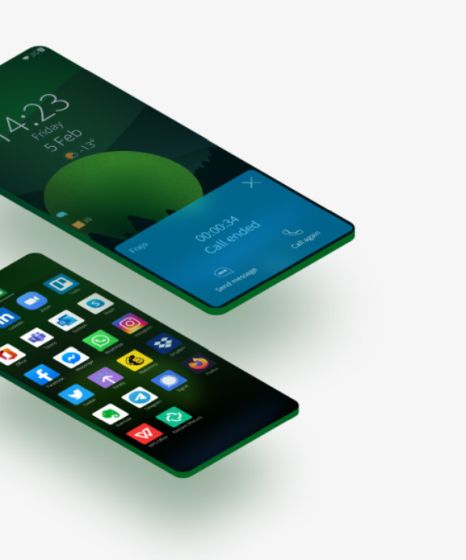
In Sailfish OS, user data is fully encrypted by its sandboxing solution called Firejail. All the connectivity and traffic runs behind a firewall with support for VPN. In terms of security, Sailfish OS is quite good and the company is making an investment to make it even more secure. Apart from all that, Sailfish OS has a distinct visual style and the gesture-based apps are fun to use. You can try Sailfish OS on Sony Xperia phones and Gemini PDA.
Pros Cons The visual style is quite good, gesture navigation A bit buggy Can run Android apps via a layer Not as performant as Android Built-in VPN and sandboxing
5. Plasma Mobile / postmarketOS
Unlike many other Android forks, Plasma Mobile is a great alternative to Android that runs on top of a Linux distribution. It has been developed using the multi-platform toolkit Qt and KDE framework that powers so many Linux distros out there. To make the skin look fluid and mobile, it uses a Plasma Shell that feels polished out of the box. Note that, it does not run Android apps, instead uses the Kirigami UI framework to create apps for Plasma Mobile. Using Plasma Mobile, many Linux distros for phones have been released, but the most popular one is postmarketOS.
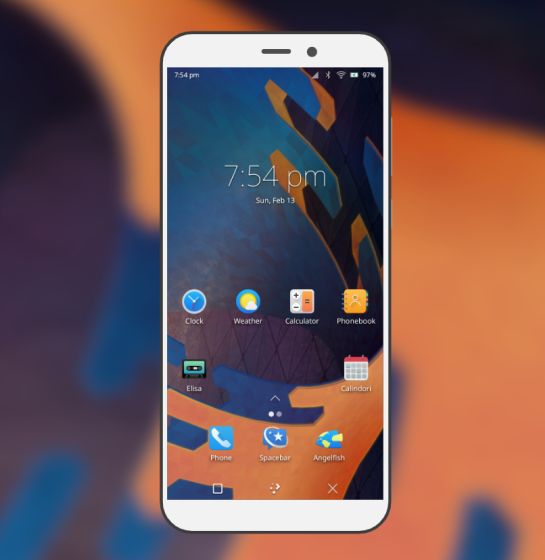
It already comes with a lot of alternative apps, built on Kirigami such as Calculator, Angelfish Web browser, AudioTube (a YouTube music client), Calindori (Calendar), Elisa (Music Play), Index (File Manager), and more. In essence, Plasma Mobile is one of the true alternatives to Android that is built on a completely different framework and has a different package manager. Currently, it supports PinePhone, Purism Librem 5, and community-supported devices like OnePlus 6, PocoPhone, etc. So if you are looking to try something new, go ahead and install Plasma Mobile on your smartphone.
Pros Cons Linux-based OS No Android apps Developed Mobile shell using new frameworks First-party apps available
Visit Website (Plasma Mobile / postmarketOS)
6. Ubuntu Touch
Ubuntu Touch is another Linux-based alternative to Android that is focused on bringing trust and privacy to smartphones. As the project is open-source, it has a huge community of developers and users who want to test, experiment, and contribute to the project. Ubuntu Touch feels and looks very identical to the Ubuntu desktop OS, however, it has been heavily optimized for touchscreen operations.
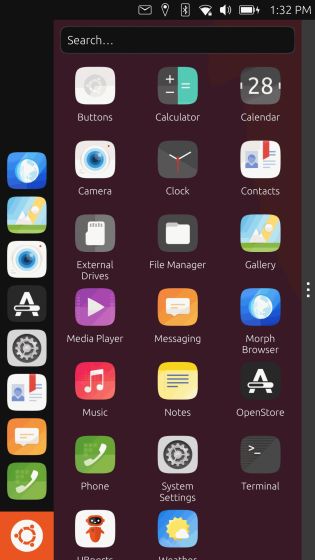
The UBports community also claims that none of your data leaves your device unless you explicitly allow it which is a good thing from the privacy point of view. Currently, Ubuntu Touch supports PinePhone, PineTab, Fairphone, Volla, Nexus 5, and OnePlus One. There are also 81 devices that are community supported so in terms of device support, Ubuntu Touch excels. Not to mention, you get all the necessary apps including the Camera app, Music, Gallery, Terminal, Clock, Dialer, etc. I would say if you want to try an open-source OS similar to Android, do give a look at Ubuntu Touch.
Pros Cons Open-source operating system, based on Linux Cannot match the third-party app support of Android Comes with all the basic apps Can function as a desktop
7. Mobian
Mobian, as the name suggests, is a Debian-based operating system for mobile devices. Currently, it does not support a whole list of devices, but Mobian can run on PinePhone, Poco F1, OnePlus 6, and some more devices. Unlike Android, it runs Linux apps and the UI is surprisingly good. It comes with all the basic apps including a Calculator, Camera, Call, Settings, and more. There is also Terminal support, in case you want to dive deep into the system.
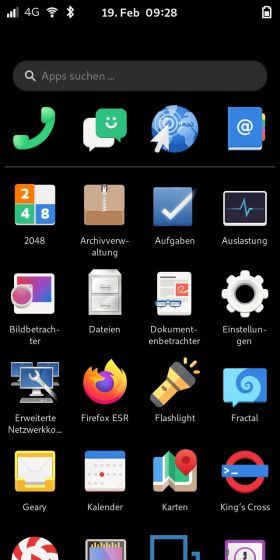
Needless to say, it does not support Android apps and the app support is limited. However, Mobian sets out to bring an alternative mobile OS to Android which is quite nice. Mobian uses Phosh, a mobile shell built by Purism, and deploys well-known frameworks like Gnome and GTK. All in all, I would say, Mobian is a potential alternative to Android and you can definitely give it a try.
| Pros | Cons |
| Mobile derivative from Debian | Limited app support |
| Popular device support | |
| Built on Phosh, Gnome, and GTK |
8. Tizen OS
If you are looking for an alternative to Android for larger screens such as TVs then Tizen OS is a better choice. Developed by Samsung, Tizen OS was aimed to run on all Samsung devices, be it smartphones, wearables, IoT devices, TVs, etc. However, fast forward now, and we are noticing Samsung is embracing Android for all its products except for the TV segment. Samsung has stopped developing phones with Tizen OS and recently, on Galaxy Watch 4, it moved to Wear OS from Tizen OS.
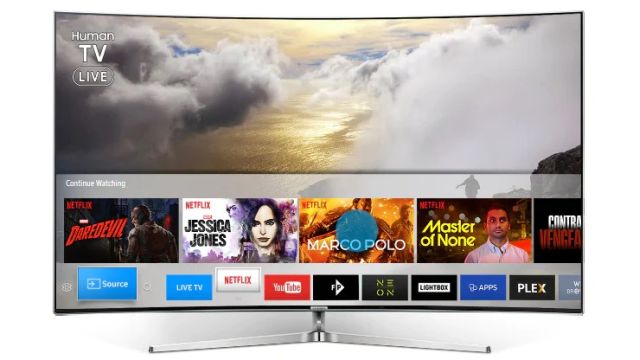
Having said all of that, for smart TVs, Samsung continues to use its Tizen OS as the project has gotten popular and lots of third-party apps have been launched including Netflix, Prime Video, etc. We have detailed a dedicated comparison between Android TV and Tizen OS so go through our article to learn more about the differences. To make it clear, as far as smart TVs are concerned, Tizen OS rules the roost and is more performant than Android TV, even on low-end hardware.
Pros Cons Great HTML5 support Third-party app support is limited Better performance than Android TV Best for the TV ecosystem
9. CalyxOS
CalyxOS is another privacy-focused alternative to Android which is completely deGoogled and puts a major focus on hardening security and privacy. It has been built by the Calyx Institute which is a New York-based nonprofit organization to make digital security more accessible to the masses. CalyxOS currently supports a handful of Pixel and OnePlus devices and Xiaomi Mi A2, but support for more devices will be added soon.
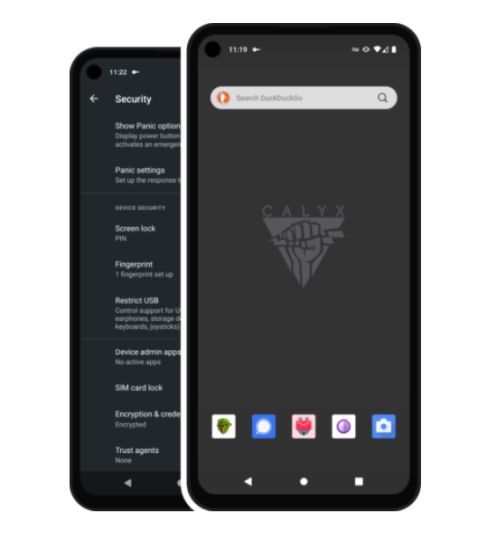
It ships with Signal for encrypted messaging; Tor browser to access the web without any tracking; a free and trusted VPN from the Calyx Institute; the open-source Aurora Store, a Play Store alternative, and more. There are no Google services included in CalyxOS but if you want, you can sideload microG to get some of the Google services without sacrificing your anonymity. To sum up, if privacy is what you are looking for on your smartphone, CalyxOS is a great alternative to other Android forks.
Pros Cons Privacy-centric OS, Based on Android Limited device support Many security features include VPN, Tor, etc. No Google Services
10. LineageOS
If your Android smartphone has hit end-of-life and no longer receives OTA updates from the manufacturer, LineageOS will come to your rescue. It’s a custom Android ROM, not much different from the standard Android that you are running on your device, however, you get to taste the latest Android version, even when the manufacturer is no longer supporting your device.

On top of that, LineageOS comes clean without Google services. You can, however, sideload the GApps package and get Play Store and other services running. It supports more than 200 devices and continuously brings the latest updates to outdated hardware. Even many custom ROMs fork LineageOS to add more functionality and features due to its rock-solid base. LineageOS has even brought the latest Android 12 update to more than 41 devices which is amazing. Simply put, LineageOS, despite being an Android fork, is a go-to alternative because of long-life support, better performance, and no Google bloatware.
Pros Cons Based on Android AOSP, Supports Android 12 None as such Supports a long list of devices Stable and Usable
11. /e/ OS
After GrapheneOS and CalyxOS, if you want another alternative to Android that is highly secure and private then you can try /e/ OS. It’s also based on Android (LineageOS), but the operating system has been completely deGoogled and there are alternative apps in place of popular Google apps. You can install apps from its own store and it even displays privacy and energy ratings, similar to iOS’ AppStore.
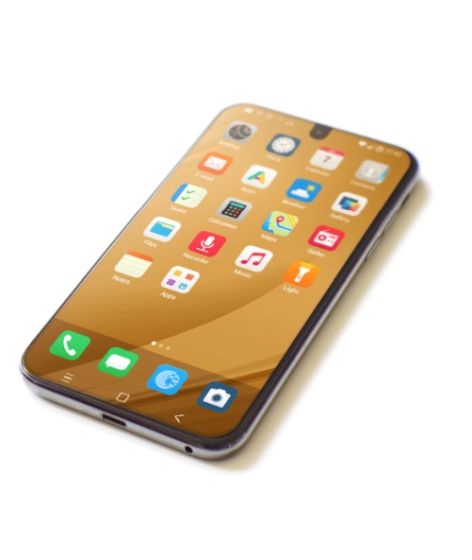
/e/ OS is completely open-source and has been developed by the non-profit /e/ Foundation which is based in France. Currently, it supports more than 240 smartphone models which include popular Samsung phones and some Fairphone models. You can also buy smartphones preloaded with /e/ OS from its website. Overall, /e/ OS is a great solution for users who are looking to buy a privacy-focused smartphone but without Google lurking from behind.
Pros Cons deGoogle Android fork, based on LineageOS /e/ preloaded smartphones are a bit expensive Vast device support Privacy rating in app store
12. HarmonyOS
After the US ban, Huawei had no recourse but to develop its own operating system for smartphones and other devices. The company developed HarmonyOS which is basically a fork of vanilla AOSP so essentially it runs Android under the hood. That said, Huawei has developed its own app packaging container called APP. You can also sideload APKs on HarmonyOS which is awesome.
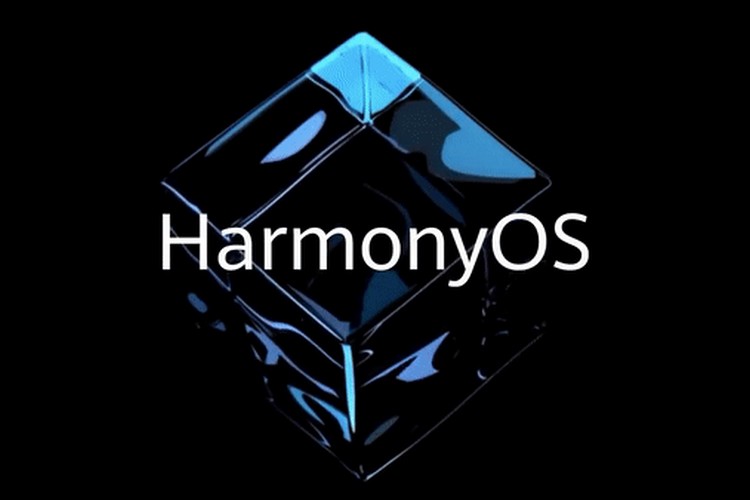
It also comes with its own AppGallery where you can find thousands of popular Android apps. The company has also developed its own compiler called ARK in place of Android’s ART (Android Runtime). And the new EROFS file system is said to be better than EXT4 and F2FS. While HarmonyOS is deep inside an Android OS, chances are that Huawei will come up with an alternative to Android in upcoming years. The company is due to release HarmonyOS 3.0 in September with new APIs and SDK.
| Pros | Cons |
| Supports APK sideloading | The core is still Android, uses the AOSP base |
| Suitable OS for Huawei ecosystem | |
| Developed its own APP package manager |
What Do You Think of These Android Alternative Operating Systems?
So these are the Android alternatives that you can try on your smartphone right now. A majority of them allow you to flash the OS on your existing smartphone, while some have partnered with hardware manufacturers to launch standalone devices with preloaded OS. Anyway, that is all from us. But what do you think about these Android alternatives? Which one of them is going to become more mainstream in the coming days? Let us know in the comments section below.


















It ssems like Microsoft track users who use duckduckgo search engine as they rely on Microsoft to give you what you search for.
In this case I prefer brave search engine
Sure and brave relies on google, therefore, by using brave you are tracked by google.
Try Mojeek, or Ghowstery
I hate Google. They are in business only to make money. The young people can be sold anything and Google loves that. I am a senior citizen and all I want is a phone I can use when I’m out of the house on the road. I use my landline at home, a no nonsense phone. The government should investigate the Google company.
I totally agree with you Barbara, Google sucks badly. I have to travel for work to my clients and I constantly get lost just from Google maps because it either can’t register where the place is at or it takes me to different routes that I don’t even need to be or need to go. By the time I reach a 15-20 minute delay of where I need to be, it then gives me the right correspondence to my destination.
So irritating, and so unprofessional on Google’s part.
The problem with investigating Google is they provide tons of data about we the people to the government. The last thing our Orwellian overlords want is to show their hand by airing out the gory details of just how invasive the surveillance and social engineering being brought to bear on us has become.
I am a young person and I also hate Google.
regardless of hardware or software you can forget about privacy – thats not happening … installing an alternate operating system can potentialy make your user experience and device more suited to your binarical wants and needs
What the f*** is “binarical?
What about Graphene OS?
Android is huge pile of crap OS over which devices that user pay for and own has none to zero control. On smart devices user should have administrative right to chose which service he wants to use/run, control over app, install/unistall etc …. That’s not possible on Android devices !
Google Play store is full of apps full of ads and fool people to spend money in games app. YouTube is a stage for Chinese and liberal propogandas. Google sells all our data’s and searches to generate ads and profit from it. I am fed up of Google.
There was a time when google allowed rooting of their phones, even welcoming users to do this as I guess it gave them free feedback. Seems all of that has now gone by the wayside as everything needs uber security to run.
I’m now in the position many others here are, and that is, stuck between a rock and a hardplace, as there are few operating systems out there that (a) Will actually work properly, and (b) be accepted by banks and the likes for security.
We could, of course risk everything and root our phones. I mean is there really any other way to beat the BS bloatware we find jammed into our devices upon each and every update. I did allow my phone to update to Android 10, for about a day, before realising just how bad it was and how it seemes to screw my WiFi calling. After much hunting, I downloaded and installed earlier firmware, sadly not as early as I would have liked, but alas, much better that A10.
I’m currently looking at the Huawei phones as they have their own OS called EMUI. I need to get into a phone store and see these for myself before finally deciding. I have also considered OnePlus phones, which too have their own Operating System, OxygenOS, which I believe to be based on Android.
I did try digging out my old Nokia 6110 but it seems that unless you get a “special” SIM card, ( whatever the heck thats supposed to mean) it won;t work. Certainly the Three and Vodafone SIMS I have been using in my S9 would not bring the 6110 into life, but, is this the way forward for us? Move back to old technology avoiding the need for involvement with these tech giants.
NOTE:
@Rocco, I too use linux for everything I do. It matters little as you do need to use a browser of some sort. On this I suggest changing your default search engine to Duck-Duck-Go, as they claim not to record anything. The only downside is that you don’t get the same number of results as you do with the two main players; Google and Bing, but on the same token, at least big brother is no longer spying.
You may also have problems with compatibility using Linux, and some flavours thereof are easier to get along with than others.
I am too sick of android and more importantly google. All my privacy is just a false claim by company as they are using it as per their profits needs. Guys suggest me something which is non android and non Google, I have never used IOS, so not aware that it also spy like android.
You many opt to not use any Google, Microsoft, or Apple OS but when you surf the internet you are using Firefox. Or when you receive your email you are using Thunderbird. Or for that matter any browser or mail client you use will SELL your information to the highest bidder. So you are back to square one.
Oh shut up!! You don’t have to use fire fox or thunderbird fool!
Major smartphone manufacturers don’t make operating systems. They just make the hardware in a contractual agreement with different providers. In fact, the only reason that smartphones are often so limited isn’t even the hardware. It’s the operating system. The provider makes a contract with Google and the hardware manufacturer to create phones for this purpose. Typically, the hardware isn’t even limited as much as the operating system is. It’s typically how Google establishes its Android operating system for the company paying for it that limits the phone in the way it does. The hardware manufacturing is just them creating the chips and such according to the design specifications that they agreed too.
I don’t know how much of this is intentional on the manufacturer’s part, if any, but I imagine the innumerable variations of smart phones making them so difficult to write alternative operating systems for, each one needing it’s own version of any given OS, is because of the cell phone companies themselves wanting to frustrate the end user so that they stick with the precise operating system in the way that the cell phone company specified to Google.
The idea of course is to prevent the end user from finding a way to alter the cell phone’s underlying OS as a means to using a different cell phone provider.
I believe it’s one of the reasons they were able to sell smartphones at lower prices, because there is a guarantee of profit in that people are forced to use their services.
Now of course, they use encryption and passcodes to lock the bootloader and such so that people cannot alter the underlying operating system. Because of changes in the laws of the United States, cell phone companies now typically provide you with a code to use competitor providers, but will require a minimum uninterrupted use of their services before they will provide you with a code to use competitor providers. Sometimes they will also provide you the code to unlock the bootloader, though not always. You must call them and ask them about that.
And usually they don’t seem to know what you’re talking about because they just want to provide a code to unlock providers, but if you keep asking, or have them transfer you to somebody who knows what a bootloader is, then sometimes you can get an answer to whether they provide that code as well. Granted I’ve never used a phone in this manner where I ask for the bootloader code after so much time of using the original provider, so it’s possible that the customer service rep was just telling me what he or she thought I wanted to hear.
From what I understand though, the phones that are sold unlocked already, are only unlocked in that you can use any provider. However, the bootloader is not necessarily also unlocked. For that, you will need to call the manufacturer of the phone to ask them if they can provide the bootloader unlock code, or perhaps they can tell you if the bootloader is unlocked by default on their originally unlocked phones.
I purchased an originally unlocked Nexus 5x some time ago. Google no longer makes them, so whatever manufacturer I bought them from online, who said they were all new by the way sold me crap. Pixels started dying within the first week.
Anyway, apparently the originally unlocked versions come with their bootloader locked, but it didn’t require a code to unlock the bootloader. It was a simple matter to install TWRP and an alternative OS.
Lately unlocking the bootloader is not enough. On my Moto G5, since upgrading to Oreo, TWRP is “detected’ as some kind of virus and wiped out even with an unlocked bootloader.
Thank you for your dissertation, really. Very informative. Answered questions I had that I didn’t even know I had. Thanks.
I am not the only one it seems fed up with their phone being hacked by google and government.
I have just bought a ga;axy a21s specifically to remove the Covid crap which will hang around forever as ID2020 kicks in. I want privacy from Government as I see them as worse than hackers going forward, snopping, tracking and everything else that they are planning to do. Covid is just the excuse for this attack on our freedom to be left alone by Government. Rant over, I want to know which O/S to put on my new phone that is likely to survive the state police and snooping long into the future. Any suggestions welcome.
We think alike, and I’m looking foward to that answer!
did you find anything that met those criteria?
Yes I’m fed up too with Google AND been fed up with Apple as well. It really pisses me off that when I buy a phone, it’s really never mine, it belongs to either of the ones above. You don’t have any choices I guess. But I might be getting a flip phone , don’t really know much about them or even if that would be a better alternative. Then do my work on my laptop alone… But then there’s Microsoft!! Really? Is there nothing we can do?
I’m so angry that these big tech bogarts force themselves on us. I really hope so much, they all go down, with all the lawsuits against them. But even if they do, there’s always . Gov 😱
Recently replaced a very good ZTE Z850 stuck on Android 5.1 and losing app support. I would be interested in an Oreo-based Android fork (maybe Lineage or Paranoid) to install on it, since my Oreo tablet with same RAM and internal storage runs nicely on Android 8.1 – I’d expect that to give it three or four years life as a spare device. Must also support microSD. But where are straightforward instructions for replacing preinstalled Android? Requires rooting, I suppose, but I’m not risking a good working device until I find a reliable how-to guide.
Gotta get away from Google.
Evil company.
True. Getaway from Google, Apple and Microsoft. These three are KILLING innovations and open market.
And their cloud is taking humans and our data to ransom.
These three are “BLACKMAILING USERS”